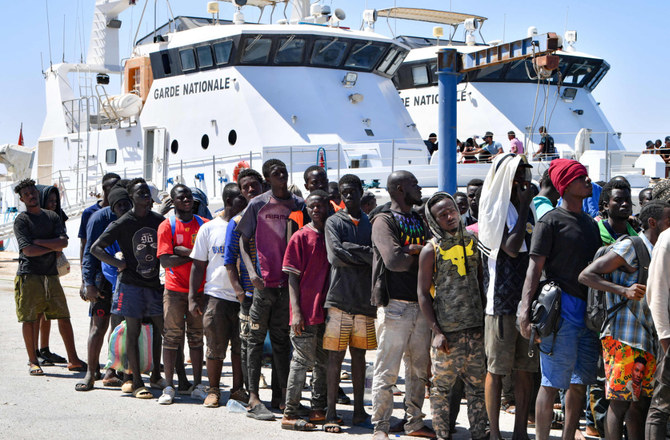
- ARAB NEWS
- 29 Apr 2024

SFAX, TUNISIA: A rubber dinghy brings back dozens of people from one of six boats the Tunisian coastguard intercepted in a 24-hour period off Sfax, a migrant launchpad for Europe.
“Our priority is to save lives,” said Mohammed Borhen Chamtouri, a commander of Tunisia’s coastguard, as the dinghy headed towards the speedboat that had spotted the migrants on radar.
Chamtouri, who is based in Sfax, was speaking after 24 hours spent intercepting and rescuing migrants who left the port city between Wednesday and Thursday.
This year, Sfax has emerged as a key hub for migrants hoping to cross the Mediterranean from the Tunisian coast, the closest point being less than 130 km from the Italian island of Lampedusa.
The International Organization for Migration says over 1,800 people have died attempting the route so far this year, more than twice as many as last year — making it the world’s deadliest migrant route.
The latest tragedy off Tunisia’s coast was a shipwreck last weekend that left at least 11 people dead and 44 missing.
“There’s no doubt about it. You’ve seen in the past 24 hours that we’ve carried out several rescues,” Chamtouri told AFP correspondents accompanying his crew. “Three boats broke down and operations were not easy for us.”
The Tunisian coastguard says it intercepted 34,290 migrants in the six months to June 20, most from sub-Saharan African countries, compared with 9,217 over the same period in 2022.
Human Rights Watch alleged on July 19 that Tunisia’s security forces, including the coastguard, had “committed serious abuses against black African migrants” that include collective expulsions and dangerous actions at sea.
The coastguard’s Sfax patrols intercepted 216 migrants who had left separately on six boats while the AFP team was on board for the search and rescue mission.
They were dozens of black African migrants, including women and children, who travelled on overloaded and fragile vessels assembled at the last minute on shore, and 75 Tunisians, all men, who were able to afford trips on sturdier boats.
When the dinghy approached their craft, the Africans cried and begged the coastguards to let them go.
One young man from the Ivory Coast told AFP he was on his “seventh attempt” to make it across the Mediterranean.
The number of Africans attempting to make the crossing has spiked since Tunisian President Kais Saied alleged, in a speech on February 21, that “hordes” of irregular migrants were causing crime and posing a demographic threat to the mainly Arab country.
Many have also fled since hundreds of migrants were arrested or chased into the desert after the deadly stabbing of a Tunisian man in a brawl between Tunisians and migrants in Sfax on July 3.
Italy says almost 94,000 migrants have arrived on its shores since the start of the year — more than double the number for the same period in 2022.
This month, the coastguard in Sfax has intercepted about 3,000 migrants in just 10 days, 90 percent of whom were from other parts of Africa, Chamtouri said.
In July, the EU signed an agreement with Tunisia that provides for €105 million ($115 million) in direct European aid to prevent the departure of migrant boats and combat smugglers.
It included €15 million earmarked to finance the “voluntary return” of 6,000 African migrants to their countries of origin.
The agreement coincided with Tunisia’s “expulsion” since early July of “more than 2,000 African migrants” to desert or inhospitable areas on the borders with Algeria and Libya, according to a count given to AFP by humanitarian sources.
Amnesty International accused the EU in response of “focusing their policies and funding on containment and on outsourcing of border control rather than ensuring safe and legal routes,” making the bloc “complicit in the suffering” of migrants.
AFP